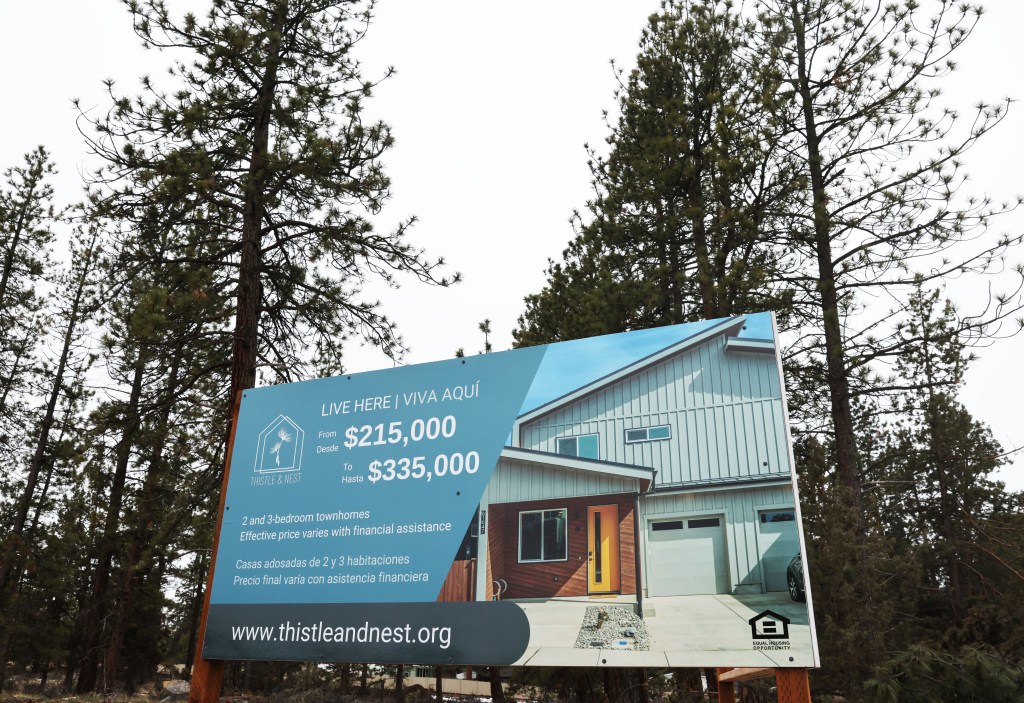Bend to inject highly touted housing grant into developer loans
Published 1:18 pm Thursday, May 22, 2025

- A housing development is planed for this wooded parcel of land in southwest Bend. 03/20/25 (Dean Guernsey/The Bulletin)
Bend’s affordable housing developers have a new tool to help make their projects pencil out.
They will soon be able to submit applications for some of the $5.7 million the city of Bend has available to help finance affordable housing projects. The funding will function as a revolving loan, meaning developers will have to pay the money back later at a low interest rate, creating a long-term source of funding for affordable housing, according to the city’s plan.
“The intention is for this to impact Bend for many years to come,” said Melissa Kamanya, affordable housing coordinator with the city of Bend.
Trending
Projects only qualify if they create housing reserved for people below a certain income threshold. The city is targeting developments that would otherwise be unable to proceed without the extra money.
A bulk of the available funds — $4 million — comes from a new and highly competitive grant the city was awarded last summer by the U.S. Department of Housing and Urban Development. The total award was $5 million. It was through a federal program aimed at identifying and smoothing over hurdles in the process of creating affordable housing, from acquiring land to navigating complexities in the development code. A federal housing official who visited Bend last summer said the city’s plan for the grant funds had the potential to “move the needle dramatically” on affordable housing production in the city. City leaders called it a “game changer.”
Bend’s median home price hit record highs in April. According to data released by the city’s urban renewal agency last year, only 16% of households in Bend can afford the average cost of $4,700 per month for a mortgage. A little more than half of households in Bend can afford market-rate rent, which requires an income of at least $72,000 a year.
A statewide housing report released in December said the city will need about 33,000 new housing units in the next 20 years to accommodate growth. Nearly 13,700 will need to be affordable to people making less than 80% of the area median income, or about $91,000 for a family of four, according to the city of Bend. “Affordable” means a household spends less than 30% of its income on housing.
Developers will only be able to use the new federal grant funds to build units that meet the threshold.
Unlike most other cities, most of Bend’s award is being offered directly to developers to help pay for the cost of building housing, rather than on fixing processes and procedures, Kamanya said.
Trending
That’s partially because the city has already made strides in code refinement and policy incentives, according to Kamanya. The city will still use $500,000 for a plan to identify procedural barriers, gaps in data and more. But one of the best ways to boost production is by getting money in the hands of developers, Kamanya said.
The city’s funding won’t be enough to pay for a project entirely, but could be the difference between a project penciling out or not, Kamanya said.
As part of the $5.7 million on the table, there is $1.5 million available from the city’s Affordable Housing Fund — generated from a fee levied on building permits — and $200,000 in federal community development grant funds awarded under the Biden administration.
President Donald Trump’s flurry of executive orders including freezes on federal funding have cast a cloud of uncertainty across the nation about the status of grant awards. According to Kamanya, the city hasn’t received any information to suggest the housing funds awarded last year will be revoked.
Threat of a clawback aside, using federal subsidies can present challenges for developers, said Amy Warren, co-founder and board president of Thistle & Nest, a nonprofit affordable housing builder in Bend. Federal funding often comes with strings attached, like prevailing wage requirements, which can make accepting the subsidies an even more expensive endeavor than going without them, Warren said.
The city’s affordable housing fee fund is less restrictive. The income threshold housing must meet to qualify — 100% area median income — is slightly higher than with the new federal grant. Thistle & Nest has used loans from the city to help pay for the first few phases of Woodhaven Estates, what will be a 133-home affordable development in southeast Bend, with homes starting at $250,000. The city’s funds are one source in an aggregate the nonprofit uses to draw down the cost of building and sell homes for less.
The new loan fund is the latest effort by the city to make housing more affordable in Bend. It parallels the launch of a program providing tax rebates for housing developments that meet certain levels of affordability. Five developers recently applied for a total of $69 million in rebates, which could help build nearly 900 units, 153 of which would be restricted by income, according to a presentation to the city council in February.









